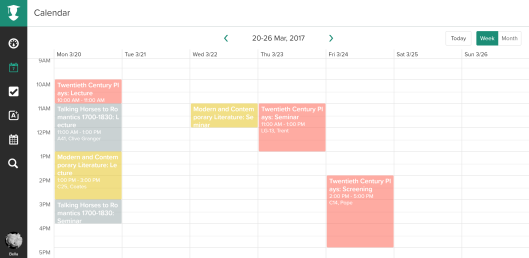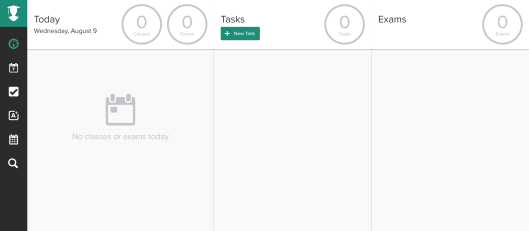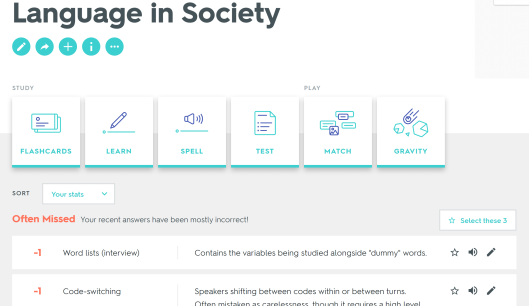Tags
advice, college, life hacks, lifestyle, student, study, study hacks, tips, university
Hi all! I’m going to do something slightly off my usual arts and culture track today and share with you my top study and organising hacks I’ve learned through school and university. Now I say these are university hacks, but you could use any of these tips and tricks for any level or area of study you would find yourself in. Many of these small things have helped to reduce my stresses and anxieties over the course of my degree, and so I hope by sharing I’ll do the same for anyone nail-biting over their academic life. Enjoy!
(Featured image for this post courtesy of @studyskylar on tumblr)
Productive Paraphernalia
- Academic diary
Whether it’s a Filofax, pin-up weekly/monthly planner or a fully fledged diary, you need to be able to keep up to date with the whirlwind that is term time. I recommend something physical instead of a virtual planner for your day-to-day as it will allow you to visualise and plan your days more effectively than on a calendar app (but stay tuned for the Apps and Technology section next for my recommendations!)
- Project notebook
Keeping yourself organised is probably the most important habit you can keep while studying. If your notes are in a mess, your head probably is too, making studying nigh-on impossible. I like using a project notebook which has divided sections for each of my modules so I have one centralised place for all my notes for the semester. Though putting individual sheets of paper in a ringbinder is also a good way to organise, it’s less liable to descend into anarchy with one notepad.
Apps and Technology (all free)
- My Study Life app
I started using this app after spotting it on a studyblr on tumblr, and it is honestly a life-saver. It kept me organised and up to date with all my classes and assignments in second year and alleviated a lot of stress as a result. It allows you to schedule your classes in a timetable and gives you notifications up to an hour in advance of them so you never unintentionally miss anything (see below, and please try to ignore my disgusting Monday I had lined up last term…). It also lets you note your tasks (essays, homework etc) and keep track of your progress through each one in percentage terms. On top of all this, on the dashboard it shows an at-a-glance summary of your day ahead. It operates as a web app or it’s available for free from the app store on iOS and Android.


- Podcasts
Assessment period – a living nightmare we know and despise. Time always seems to be running short at this stage in the academic year, so making the most of your day is key. I have a walk of about half an hour onto campus when I have class, so something I’ve found useful is listening to a podcast or lecture on a topic I’m studying or revising. Absorbing information by any and all means is helpful! Learn Out Loud has a huge database of educational podcasts available for free. So barrage your senses with knowledge, kids.
- Khan Academy
This one is primarily for science and maths subjects, but also for a select few humanities. Khan Academy is an incredible resource. It has video lessons, podcasts, interactive learning/revision exercises and, to top it all off, it’s completely free. I found it very useful in my GCSE sciences, but it extends through all grades up through to the end of high school and beyond.
- QuizUp
Bear with me here, this app isn’t just for Harry Potter quizzes. If you’re not familiar with it, it’s a quick-fire competitive quiz game that pits you against people from around the world to answer questions about certain topics as fast as possible (or you can play solo, if that sounds more appealing). If you have a browse through the categories, there are educational and academic topics that you can try your hand at. Alternatively, if what you’re studying is too niche, you can create your own quiz and answer questions that way.
- Quizlet
This is one of the best sites for revising key terms ever. You can enter your terminology and definitions into a spreadsheet-type list and it gives you loads of different ways to revise them. From exam question structures to flashcards, matching exercises and games, it really is the be-all and end-all of revision sites.

My sociolinguistics revision last year on Quizlet.
Healthy Habits
- Post-it notes… everywhere
More on making the most of your time here. Something I have found invaluable is sticking brief, flash-card length revision segments around my room and my uni house. Having little reminders of definitions and concepts really helped to engrain the information for quick recall. Also, I’ve found that visualising a space and allocating information to places in that space has aided in more accurate recollection of information and detail – almost like a mind palace, for any Sherlock fans among you.
- Teach or be teached
Practically everyone who talks about effective revision makes the point that articulating concepts and ideas in your own words is a highly useful way to make the information sink in. So, teaching (or being taught) is a great way to do this without taking reams of notes and also taking a moment to socialise. If your friend is struggling with a theory, explain it in terms you both understand. While teaching my friend a sociolinguistic theory last term, I used one of our inside jokes to illustrate the concept. He came back to me after the exam and said he’d remembered it because of that example we’d come up with together. Framing the information in an unusual or funny way is a great technique, and can make the revision feel a little more bearable.
- Exploit your lecturers
Well, no, not like that, you shouldn’t need to extort help out of them. Your teachers, lecturers and tutors are there for your benefit. In my experience, they are a vastly underrated resource when it comes to studying and students tend not to take full advantage of what they have to offer. If they’re worth their salt, then they should always be happy to help. If you’re stuck, send them an email or pop into their in-office hours to talk things over. (Also, top tip: if you’re set an essay or a piece of coursework, draft up a plan, show it to your seminar tutor/lecturer and ask if there is anything you can do to make it a top grade – this greatly increases the likelihood of you going in the right direction with it and bumping up your grade considerably.)
So there it is! My blueprint for attempted sanity while studying. I know I haven’t mentioned the basics like taking breaks, eating well, planning, colour-coding etc., but those are well covered in most other study posts and the bits mentioned in this post seemed like lesser-known bits of advice. I hope some of these prove interesting or useful to you and that they help in making your studying life run a little more smoothly.
Do you have any hacks, tips or tricks I haven’t mentioned here? Drop a line in the comments and let me know!
Love,
Bella x
(Featured image courtesy of @studyskylar on tumblr)

effin quizlet gives me nightmares after that langsoc exam
LikeLiked by 1 person
it was legit the only reason I passed that exam lol
LikeLike
Great tips! I am also addicted to post-it notes lol. Feel free to check out my blog for tips on how to eat healthfully in college! I am a double major in dietetics and journalism at the University of Maryland. https://theartsypalate.wordpress.com/
LikeLike
Fantastic! Thank you so much for the tips!
LikeLike